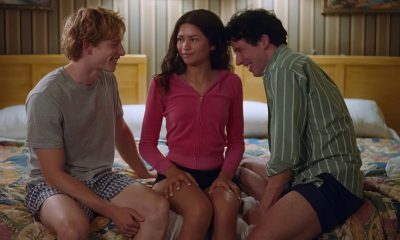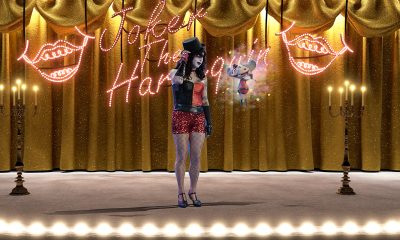Movies
Despite Hollywood strikes, a number of queer films, TV shows coming in fall
‘Rustin,’ ‘Nyad’ among season’s highlights
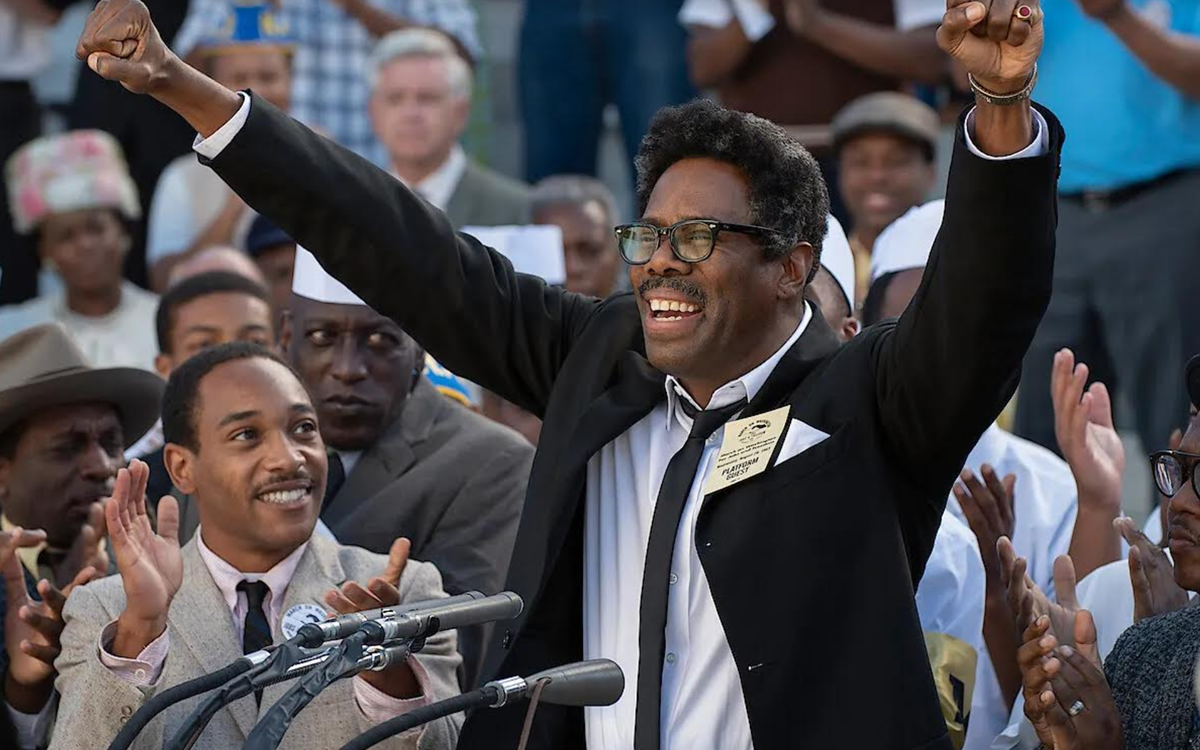
We’re not going to lie: the prospects for our fall entertainment (and beyond) are looking grimmer than usual, thanks to the strikes that have Hollywood’s writers and actors off the job for an indefinite chunk of the future. Sure, there are lots of titles that were in the can and ready to go before the talent walked off the set, but with no certain end date in sight and a union-mandated ban on participation in publicity efforts, much of the ready-to-go content remains in release-date limbo, while prospects for new material being produced anytime soon are pretty much nil.
Even so, we’ve managed to put together a solid list of titles that are officially on the slate for this autumn, and we think it will give you more than enough to look forward to while we all wait for the entertainment industry to cobble together some kind of mutually acceptable agreement that will allow it to get back to work.
The list, by release date, is below.
Cassandro, Sept. 15 (Theaters)/Sept. 22 (Prime Video)
Mexican actor Gael García Bernal, long a queer fan favorite thanks to his roles in films like “Y tu mamá también” and “Bad Education,” stars as the real-life Saúl Armendáriz, a gay amateur wrestler from El Paso who reinvents himself as the flamboyant title character and rises to international stardom as the “Liberace of Lucha Libre” – turning both the macho wrestling world and his own life upside down in the process. Acquired by Amazon even before its world premiere at this year’s Sundance Festival, this wild-and-wooly biopic was directed by Roger Ross Williams, who became the first African-American director to win an Oscar for his 2009 short film “Music by Prudence,” and it has all the earmarks of a “must-see.” Also starring Roberta Colindrez, Perla de la Rosa, Joaquín Cosío, and Raúl Castillo, with special appearances from El Hijo del Santo and Benito Antonio Martínez Ocasio (aka Bad Bunny, for those who didn’t know).
Sex Education, Season 4, Sept. 21 (Netflix)
The cast of this runaway UK hit has come a long way since the series debuted in 2019, with the imminent debut of breakout star Ncuti Gatwa as the new titular Time Lord of the venerable cult sci-fi series “Dr. Who” and his appearance, alongside co-stars Emma Mackey and Connor Swindells, in Greta Gerwig’s blockbuster hit “Barbie,” but that’s not enough to keep the whole student body from reuniting for a final season as they join fellow headliners Asa Butterfield and Gillian Anderson to wrap up the deliciously scandalous storylines that have made this good-natured dramedy about life and sexual discovery in a rural English secondary school a favorite for queer and straight audiences alike. Besides taking us along with its irresistible cast of misfits on a new set of adventures, it features “Schitt’s Creek” star and co-creator Dan Levy in special appearance as a new character – but even without that extra icing on the cake, we would have been ready to click “watch now” the second this one drops. If you’re already a fan, you don’t need our endorsement to bring you on board; if you’re not, we advise you to do a catch-up binge on seasons 1-3 in time to join the rest of us as we enjoy the final batch of episodes from this refreshing, queer-embracing, sex-positive slice of saucy absurdity.
American Horror Story: Delicate, Sept. 21 (FX/Hulu)
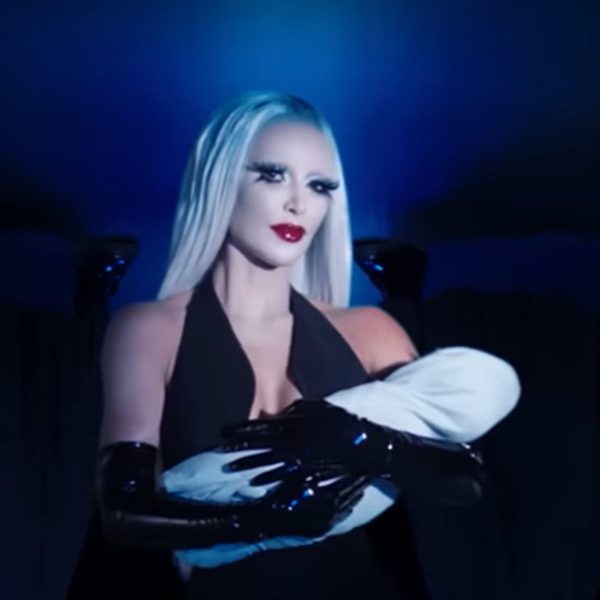
The 12th season of Ryan Murphy’s now-venerable and uncompromisingly queer horror anthology series has been, like the preceding installments, shrouded in mystery – though the inclusion of reality star Kim Kardashian in a starring capacity has garnered much publicity, and not a little controversy, due to skepticism about her acting chops. Despite these misgivings, it’s still probably one of the most anticipated entries on this list, the return of a queer fan favorite that – while it may have a reputation for uneven quality, haphazard storytelling, and fizzling out before it reaches the end – continues to draw the kind of audience numbers that has made it a tentpole autumn TV staple for a dozen years and counting. Sure, it’s a guilty pleasure, but we all have our share of those, and when they come in as slick and stylish a package as this elegantly garish and unapologetically campy pulp culture stalwart, who can resist? Also starring series veteran Emma Roberts, with fellow alums Zachary Quinto, Billie Lourd, Denis O’Hare, and Leslie Grossman also coming to the table, as well as Golden Globe winner Michaela Jaé Rodriguez and newcomer to the Murphy fold Matt Czuchry (“Gilmore Girls,” “The Good Wife”).
Dicks: The Musical, Oct. 6 limited/Oct. 20 wide (Theaters)
Comedy legend Larry Charles (“Seinfeld,” “Borat”) directed this outrageously titled and absurdly satirical farce, adapted by screenwriters and co-stars Aaron Jackson and Josh Sharp from a stage production they created as members of the Upright Citizen’s Brigade. The pair star as two self-obsessed, conspicuously heterosexual businessmen and very close friends who discover they are also long-lost identical twins, sparking a “riotously funny and depraved” plot to reunite their eccentric divorced parents (Nathan Lane, Megan Mullally). Also starring Megan Thee Stallion and Bowen Yang (as God, no less), and teasing the kind of campy, transgressive vibe that marks all the true classics of underground queer cinema, the press for this one touts it as “a queer, hard-R musical comedy which may very well additionally be a future midnight-movie classic.” Frankly, that’s more than enough to earn it a place on our not-to-be-missed list.
Eismayer, Oct. 6 (Theaters/Oct. 10 Digital)
Fans of queer foreign movies can look forward to this Austrian entry, an award-winner at Venice and other prestigious film festivals, from director David Wagner. Gerhard Liebmann stars in the title role, a legendary real-life drill instructor in the Austrian Armed Forces; renowned for his brutal toughness and his uber-macho image, he leads a double life of anonymous sexual encounters with men behind his wife’s back, but when an openly gay new recruit (Luka Dimić) challenges both his authority and his rigid ideas about masculinity, he finds himself drawn into a relationship that will leave “his closeted existence shaken to the core.” A boot camp drama that challenges toxic traditional conceptions of what it means to “be a man” – especially one that is based on a true story – is always welcome, and this one comes with a substantial amount of praise to recommend it. Also starring Julia Koschitz and Anton Noori, it might not be “feel-good” entertainment, but the buzz says it’s worth seeking out for anyone with a taste for raw and uncompromising cinema.
The Matthew Shepard Story: An American Hate Crime, Oct. 9 (ID Discovery)
Just in time for the 25th anniversary of his death, Investigation Discovery premieres a new documentary honoring Matthew Shepard’s life and legacy, featuring interviews from Matthew’s friends and allies, as well as local journalists and community members, and commentary from key celebrity voices deeply affected by Matthew’s tragic story, including Rosie O’Donnell, Andrew Rannells and Adam Lambert. Considered one of the worst anti-LGBTQ hate crimes in American history, Matthew’s shocking murder captured America’s attention and became a turning point in the fight for queer rights, jump-starting a long-overdue conversation about the discrimination, danger, and violence that many LGBTQ Americans face – especially in rural communities – every day, and if we’re being honest, there’s been no shortage of documentaries about it. Even so, this one, which benefits from the perspective granted by time and also casts attention on the progress society has made toward queer acceptance (as well as the work that still need to be done), promises to offer the kind of scope that gives it a relevance beyond simply lamenting the unjust cruelty perpetrated against a young gay man who – like all martyrs – became an unwilling touchstone in the eternal fight against bigotry, bullying, and brutality fueled by hate.
Candela, Oct. 10 (Digital)
Another international offering with a somewhat more exotic premise, this festival-acclaimed thriller co-produced by France and the Dominican Republic is set in the city of Santo Domingo, where the fates of three strangers – a privileged young high society woman, a lonely and alcoholic police lieutenant, and a charismatic cabaret drag performer – are entwined by the death of a young poet and drug dealer on the eve of an advancing hurricane. Directed by Andrés Farías Cintrón and touted as “a Caribbean pop movie,” it’s been noted by advance reviewers for its stunning imagery and visual style, its offbeat and captivating characters, and an “edge-of-your seat” suspenseful plot full of meticulously-crafted twists and turns. Starring Cesar Domínguez, Félix Germán, Sarah Jorge León, Ruth Emeterio, Frank Perozo, Yamile Scheker, and Katherine Montes, you won’t find this one at your local multiplex, but it should be well worth the handful of clicks it takes to queue it up on your VOD platform of choice.
Anatomy of a Fall, Oct. 13 (Theaters)
French filmmaker Justine Triet’s (“Sibyl”) latest film was entered as a competitor for the Queer Palm at the 2023 Cannes Film Festival, but it ended up taking the festival’s top prize, the prestigious Palme d’Or. Publicized as “a Hitchcockian procedural,” it centers on a German writer (Sandra Hüller) accused of murdering her French husband, who must prove her innocence at trial with only the testimony of her blind son – the sole witness – to back up her claims. Hüller’s performance has won raves, and the film was a hit when it went to general release this summer in its native France (only “Barbie” topped it at the box office); as for details about the nature of the movie’s queer relevance, you’ll have to find out the details firsthand, because advance press on this side of the Atlantic has remained scrupulously spoiler-free, though Triet has revealed that she drew inspiration from the case of Amanda Knox, who was notoriously accused of murdering her roommate during a trip to Italy. Our verdict is that it will be worth the effort.
Nyad, Oct. 20 (Theaters/Nov. 5 Netflix)
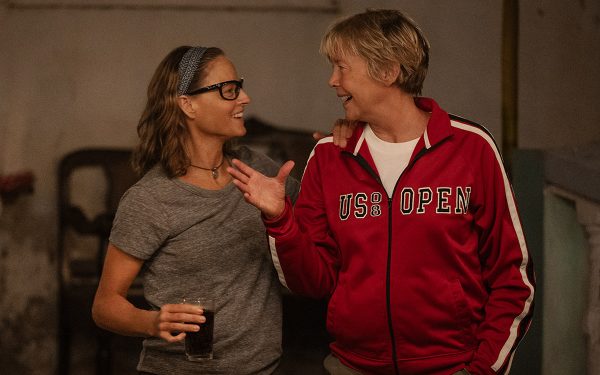
Billed as “a remarkable true story of tenacity, friendship and the triumph of the human spirit,” this high-profile biopic stars four-time Academy Award nominee Annette Bening as marathon swimmer Diana Nyad, who, three decades after exchanging the life of a world-class athlete for a prominent career as a sports journalist, becomes obsessed with becoming the first person to complete the 110-mile journey from Cuba to Florida – known as as the “Mount Everest” of swims – without a shark cage. The screenplay by Julia Cox is adapted from Nyad’s own memoir (“Find a Way”), two Oscar-winning documentarians (Elizabeth Chai Vasarhelyi and Jimmy Chin, responsible for the popular and acclaimed “Free Solo”) make their narrative film debut at the helm, and Bening is joined onscreen by two-time Oscar-winner Jodie Foster as her best friend and coach. What else could anyone ask for in a strong, inspirational piece of lesbian-themed filmmaking? Count us in.
Rustin, Nov. 3 (Theaters/Nov. 17 Netflix)
Probably the most high-profile piece of queer filmmaking of the upcoming season is this biopic about the gay Black architect of 1963’s world-changing March on Washington, Bayard Rustin. Starring Emmy-winner Colman Comingo in the title role and helmed by five-time Tony-winning director George C. Wolfe, this ambitious fictionalized portrait of an extraordinary, history-making queer hero shines a long overdue spotlight on a man who, alongside giants like the Reverend Martin Luther King Jr., Adam Clayton Powell Jr., and Ella Baker, dreamed of a better world and inspired a movement by marching. Notably, it also comes from Higher Ground, a production company founded by Barack and Michelle Obama, and its August premiere at the Telluride Film Festival resulted in a 100% (so far) approval rating on Rotten Tomatoes from the critics who were there to see it. Besides the powerfully charismatic Domingo, the film features an all-star cast including Chris Rock, Glynn Turman, Aml Ameen, Gus Halper, CCH Pounder, Da’Vine Joy Randolph, Johnny Ramey, Michael Potts, and special appearances from Jeffrey Wright and Audra McDonald.
Movies
It’s game, set, and mismatch in unfulfilling ‘Challengers’
Not quite a bisexual love story for the ages
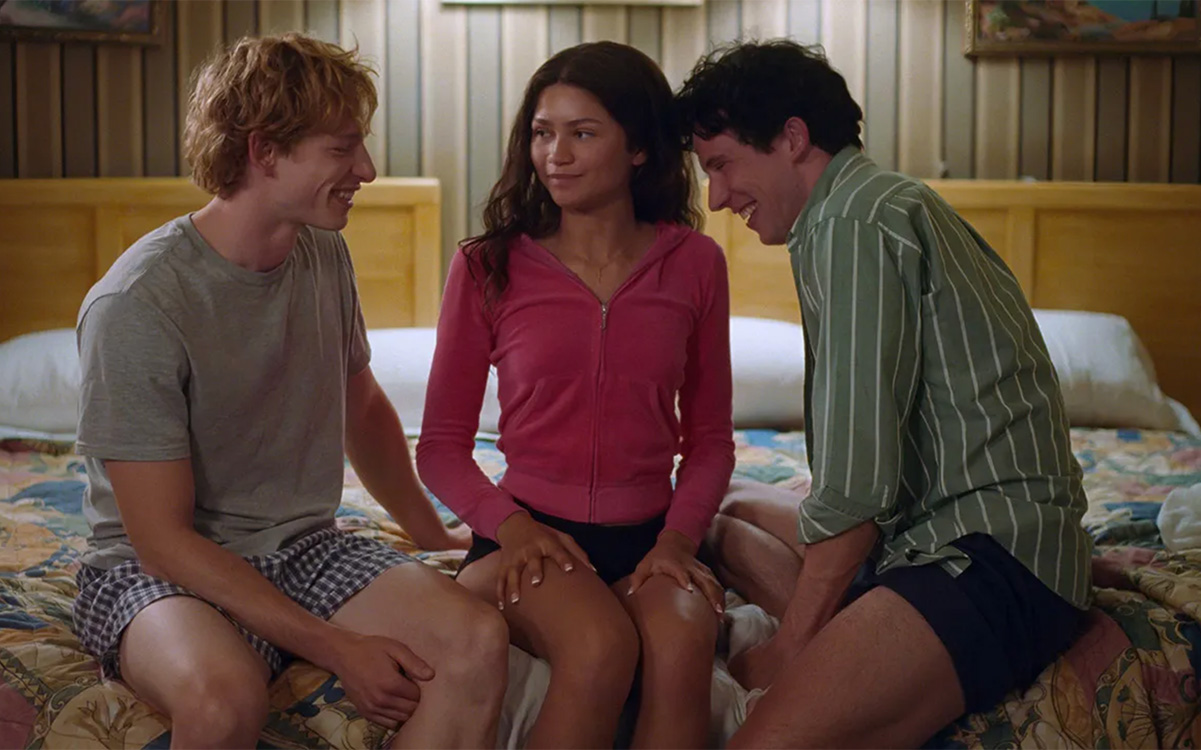
For months now, most of the buzz around Luca Guadagnino’s newest film – “Challengers,” starring Zendaya as a professional tennis coach caught in an ongoing romantic triangle with a pair of male rival players – has been about how “bisexual” it would be.
After all, this was the man that brought us “Call Me By Your Name,” and even if the Italian filmmaker’s work has not always been that queer in focus, this premise was begging for it; and when the trailers started to drop, heavily laden with imagery that made the bisexual subtext blatantly obvious, the speculation – and the anticipation – only grew.
As it turns out, “Challengers” wasn’t teasing us in vain – but it may not even matter, because after spending two hours and 10 minutes with these characters, it’s hard to imagine any viewer, whether straight, bi, or a total “Kinsey 6,” wanting to feel represented by them.
Told in a non-linear patchwork format, Guadagnino’s movie – penned by Justin Kuritzkes – chronicles the complicated relationship that develops when two high school tennis champs, boyhood friends Patrick and Art (Josh O’Connor and Mike Faist, respectively), encounter high-profile pro prospect Tashi (Zendaya) at the US Open juniors. Infatuated at first sight as much by her prowess at the game as by her looks or personality, they woo her together, resulting in a steamy but thwarted three-way experience that ends with her promising her phone number to the one who wins the next day’s match.
More than a decade later, Tashi and Art are a married, wealthy power couple with a child; they’ve risen to fame after Tashi, sidelined by injury into a career as a world-class coach, has helped Art rise to international prowess, while Patrick, who originally won the challenge to become Tashi’s lover, has sunken to the level of low-ranked has-been after brief professional success. Art has hit a slump in his upward trajectory, so to freshen up his game, Tashi enters him into a small-time “challenger” tournament where Patrick, now scraping by on his meager winnings from lower circuit events such as this one, is a “wild card” entry. The rekindling of old rivalries and complex feelings between this intertwined trio of “players” results in a final competition in which the outcome has more to do with unrequited personal passions than it does with tennis.
Ostensibly both a sports movie and a romantic drama, it’s a film that wastes no time in tying its two themes together for an exploration of how the competitive instinct that might be essential to one can be a major obstacle when it comes to the other. Thanks to its back-and-forth time structure, we are rushed through all the necessary twists and turns of a 13-year romantic triad quickly enough to recognize immediately that the need to “win” supersedes every other desired outcome for these three people; more than that, in the broad strokes that emphasize the quick deterioration of their affections in the pursuit of the “game” (a word we use here both literally and figuratively), it becomes obvious that none of them are capable of recognizing how much influence their lust for victory has over their relationships with each other. To put it bluntly, in an era when polyamory has gained traction as a legitimate variation on the spectrum of human commitment, “Challengers” reads a little bit like a primer on how NOT to do it right.
That might, of course, be a big part of the point. In a story about professional athletes driven by the urge for victory trying to negotiate the delicate balance of self-respect and selflessness required to maintain a successful romantic partnership – no matter how many partners may be involved – it’s probably an inescapable element of the plot that there would be a struggle to reconcile those two conflicting impulses. The trouble is that, here, the three characters involved are so far removed from typical human experience that it becomes difficult to relate to any of them. They operate within a privileged world that is out of reach for most of us, and the conflicts that arise in their triad dynamic mostly arise from pure ego. It’s hard to feel empathy for such individuals, frankly, especially when it’s clear that their own mindset is the greatest obstacle to fulfillment in their lives, both professionally and personally. They’re all spoiled brats, and unrepentantly so.
It’s because of this that “Challengers” comes off as the kind of glossy, old-Hollywood fantasy that is more about wish fulfillment than anything else. Each of its protagonists is impossibly attractive; fit, sexy, and living an enviable life even when they’re struggling just to get by. They are the kind of people many of us wish we could be – and that, ironically, perhaps makes us dislike them all the more.
None of this is the fault of the players, who uniformly give the kind of fully invested performance that illuminates the humanity of their characters beyond negative cliches. Zendaya, never shying from her role as master manipulator in the film’s twisted “long con” romance, makes us feel the visceral need for competition that eclipses her less imperative impulses toward personal connection. O’Connor (“God’s Own Country,” “The Crown”) and Faist (Broadway’s “Dear Evan Hansen,” Spielberg’s “West Side Story”) are not only eminently likable, but present an unvarnished and completely believable chemistry as would-be-lovers who can’t quite get past their self-judgment to embrace the obvious feelings they have for each other. The fact that we believe equally in their impulse toward the dazzlingly self-actualized Zendaya makes their performances all the more stellar. Unfortunately, within the larger context of the film, their appeal is tarnished by our ambivalence toward the dynamic the characters perpetuate between themselves.
And what of their sexuality? Is “Challengers” that rare mainstream movie that vaults over the film industry’s long-lamented “bi erasure” to present a bisexual love story for the ages? Not quite. Even if its ending (spoiler alert!) suggests that the entire movie has been about two men getting over their toxic masculinity to embrace their true feelings for each other, the fact that it never defines that relationship as a queer one and chooses instead to leave it up to our individual interpretation feels like something of a cop out. In the long run, perhaps, it’s a better tactic to avoid labeling its relationships in terms of sexuality, since the cultural “endgame” at stake has arguably more to do with normalizing diversity than amplifying an individual sense of identity – but even so, it can’t be denied that, when “Challengers” reaches its final moment, we’re left with a sense of ambiguity that feels far too “safe,” too much a capitulation to the fragile mainstream sensibility, to advance a sense of acceptance for the “B” in “LGBTQ.” In the end, it’s a movie that stops short of the mark for the sake of the lowest common comfort zone.
Which is why, sadly, we have to set “Challengers” aside as a failed – if well-meaning – attempt at providing visibility for the most traditionally invisible faction of the queer community, instead of the unequivocal validation of bisexual attraction we’re still waiting to see.
Movies
‘Housekeeping for Beginners’ embraces true meaning of family
Another triumph from young filmmaker Goran Stolevski
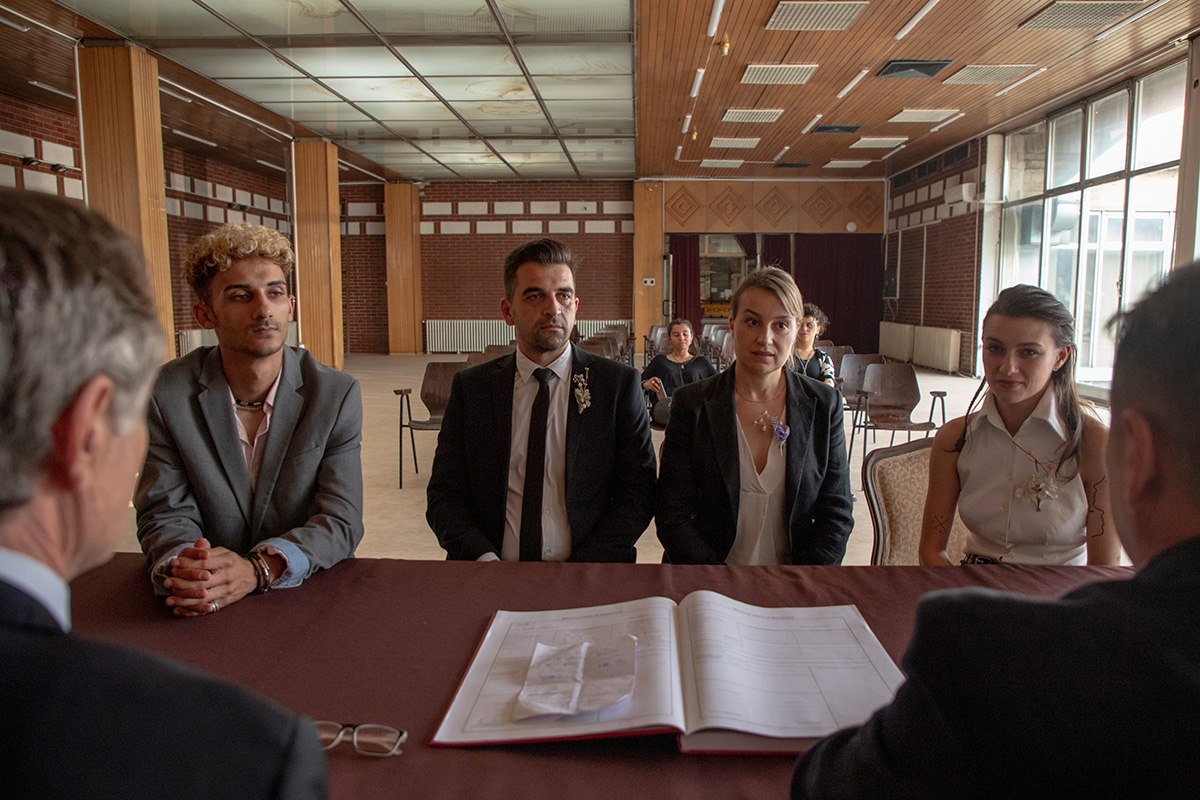
Once upon a time in America, queer people sometimes adopted their lovers as their “children” so that they could be legally bound together as family.
That’s not a revelation, though some queer younglings may be shocked to learn this particular nugget of hidden history, nor is it a call to political awareness in an election year when millions are actively working to roll back our freedoms. We bring it up merely as a sort of context for the world that provides the setting in “Housekeeping for Beginners,” the winner of the Queer Lion prize at 2023’s Venice Film Festival, which opened in limited U.S. theaters on April 5 and expanded for a wider release last weekend.
Written and directed by Goran Stolevski – a Macedonian-born Australian filmmaker whose two previous films, “You Won’t Be Alone” and “Of An Age,” both released in 2022, each met with critical acclaim – and submitted (unsuccessfully) as the official Oscar entry for International Feature from the Republic of North Macedonia, it’s a movie about what it means to be “family,” which touches on the political while placing its focus on the personal – in other words, on lived experience rather than ideological argument – and, in the process, drives home some very important existential warnings at a time when things could go either way.
Set in the North Macedonian capital of Skopje, it centers on social worker Dita (Anamaria Marinca), a middle-aged lesbian, whose house is a safe haven for a collection of outcasts. First and foremost is her girlfriend Suada (Alina Serban), a single mother of Romani heritage, but the “chosen family” in the household also includes Suada’s daughters, teenaged Vanesa (Mia Mustafi) and precocious 5-year-old Mia (Dżada Selim); Dita’s long-term friend Toni (Vladimir Tintor), a middle-aged gay man who works night shifts at a mental hospital; Toni’s new, much-younger boyfriend Ali (Samson Selim); and Elena (Sara Klimoska), an older and more worldly schoolmate of the other girls who serves as a makeshift big sister.
It is, unsurprisingly, a chaotic environment, a sea of revolving situations that largely goes on without Dita’s direct involvement, though she occasionally asserts more authority than she either has or cares to wield. That all changes, however, when Suada is diagnosed with aggressive pancreatic cancer, leading her to extract from her lover the promise that she will be mother to her children when she’s gone.
If you want a spoiler-free experience, you should stop reading now; further discussion of “Housekeeping for Beginners” requires us to reveal that Dita is forced to make good on that promise, even though she’s never had the desire to be a mother, and it’s not just a matter of making sure the kids get all their daily meals and show up for school on time. In North Macedonia, where same-sex relationships are not illegal but are neither granted the validation of lawful protections, the adoption of children requires a woman to have a husband, which means entering into a sham marriage with Toni – who is not quite a 100% onboard, himself – and listing him as the girls’ father. More difficult, perhaps, is gaining the trust of Suada’s two daughters, neither of whom is exactly receptive to the prospect of exchanging their real mother for a half-willing replacement. It’s this challenge that proves most daunting, triggering a crisis that will put every member of this cobbled-together family group to the test if they are to have any hope of hanging on to each other and making it work – something to which Dita finds herself growing deeply committed, despite her initial reticence about taking on the role of default matriarch.
Shot in Stolevski’s accustomed milieu – an intimate, cinema verité style built on handheld camerawork and near-exclusive reliance on close-up framing to capture the awkward blend of comfort and claustrophobia that often accompanies life in a crowded household environment – and leaving most of the expository cultural details, such as the impact of ethnic “caste” and the complicated hierarchy of layers involved in negotiating a peaceful coexistence with “normal” Macedonian society when your domestic and familial structures are anything but “normal”, to be gleaned by context rather than direct explanation. It works, of course; there’s something universally recognizable about the difficulty of “blending in” that helps us bridge the gap even if we don’t quite understand all the fine points as well as we might if we, like Stolevski, had grown up having to deal with them directly.
Even so, there are times when a bit of distance might be missed by audiences in need of a wider scope; it’s hard, after all, to get a palpable sense of space and location when most of what we see onscreen are the upper thirds of whichever cast members happen to be featured in each particular scene. But in case that sounds like a criticism, it’s important to point out that this is part of the film’s magic spell – because by making its physical environment essentially synonymous with its emotional one, Stolevski’s movie delivers its human truth without the unnecessary distraction of learning the ins and outs of a foreign cultural dynamic. The things we need to grasp, we do, without question, even if we don’t quite understand the full context, and what we walk away with in the end is a universally recognizable sense of family, carved in stark relief among a group of people who find it among themselves despite the lack of blood ties or common history to bind them to each other. That makes “Household for Beginners” an unequivocal triumph in one way, at least, because by driving home that hard-to-convey understanding, it manages to underscore the injustice and inhumanity of any world in which the validity of a family is subject to the judgment of cultural bias.
That’s not to say that “Housekeeping” is an unrelenting downer of political messaging. On the contrary, it is lifted by a clear imperative to show the joys of being part of such a family; the humor, the snark, the bright spots that arise even in the darkest moments – all these are amply and aptly portrayed, making sure that we never feel like we are being fed a doom-and-gloom scenario. Rather, we’re being reminded that it’s the visceral happiness that comes from being connected with those we love that matters far more than the rules and judgments of outsiders, which makes the hoops Dita and company have to jump through feel all the more absurd.
Though Stolevski, an Aussie citizen unspooling a narrative based in his country of origin, might not have intended it as such, the message of his film strikes a particular chord in 2024 America. The hardships of Dita and her brood as they try to simply stay together are a clear and pointed warning not to take for granted the hard-won freedoms that we have.
Add to that a superb collection of performances (BAFTA-winner Marinca and first-time actor Selim are standouts among the many), and you have another triumph from a young filmmaker whose reputation only gets more stellar with each effort.
Movies
After 25 years, a forgotten queer classic reemerges in 4K glory
Screwball rom-com ‘I Think I Do’ finds new appreciation

In 2024, with queer-themed entertainment available on demand via any number of streaming services, it’s sometimes easy to forget that such content was once very hard to find.
It wasn’t all that long ago, really. Even in the post-Stonewall ‘70s and ‘80s, movies or shows – especially those in the mainstream – that dared to feature queer characters, much less tell their stories, were branded from the outset as “controversial.” It has been a difficult, winding road to bring on-screen queer storytelling into the light of day – despite the outrage and protest from bigots that, depressingly, still continues to rear its ugly head against any effort to normalize queer existence in the wider culture.
There’s still a long way to go, of course, but it’s important to acknowledge how far we’ve come – and to recognize the efforts of those who have fought against the tide to pave the way. After all, progress doesn’t happen in a vacuum, and if not for the queer artists who have hustled to bring their projects to fruition over the years, we would still be getting queer-coded characters as comedy relief or tragic victims from an industry bent on protecting its bottom line by playing to the middle, instead of the (mostly) authentic queer-friendly narratives that grace our screens today.
The list of such queer storytellers includes names that have become familiar over the years, pioneers of the “Queer New Wave” of the ‘90s like Todd Haynes, Gus Van Sant, Gregg Araki, or Bruce LaBruce, whose work at various levels of the indie and “underground” queer cinema movement attracted enough attention – and, inevitably, notoriety – to make them known, at least by reputation, to most audiences within the community today.
But for every “Poison” or “The Living End” or “Hustler White,” there are dozens of other not-so-well-remembered queer films from the era; mostly screened at LGBTQ film festivals like LA’s Outfest or San Francisco’s Frameline, they might have experienced a flurry of interest and the occasional accolade, or even a brief commercial release on a handful of screens, before slipping away into fading memory. In the days before streaming, the options were limited for such titles; home video distribution was a costly proposition, especially when there was no guarantee of a built-in audience, so most of them disappeared into a kind of cinematic limbo – from which, thankfully, they are beginning to be rediscovered.
Consider, for instance, “I Think I Do,” the 1998 screwball romantic comedy by writer/director Brian Sloan that was screened last week – in a newly restored 4K print undertaken by Strand Releasing – in Brooklyn as the Closing Night Selection of NewFest’s “Queering the Canon” series. It’s a film that features the late trans actor and activist Alexis Arquette in a starring, pre-transition role, as well as now-mature gay heartthrob Tuc Watkins and out queer actor Guillermo Diaz in supporting turns, but for over two decades has been considered as little more than a footnote in the filmographies of these and the other performers in its ensemble cast. It deserves to be seen as much more than that, and thanks to a resurgence of interest in the queer cinema renaissance from younger film buffs in the community, it’s finally getting that chance.
Set among a circle of friends and classmates at Washington, D.C.’s George Washington University, it’s a comedic – yet heartfelt and nuanced – story of love left unrequited and unresolved between two roommates, openly gay Bob (Arquette) and seemingly straight Brendan (Christian Maelen), whose relationship in college comes to an ugly and humiliating end at a Valentine’s Day party before graduation. A few years later, the gang is reunited for the wedding of Carol (Luna Lauren Vélez) and Matt (Jamie Harrold), who have been a couple since the old days. Bob, now a TV writer engaged to a handsome soap opera star (Watkins), is the “maid” of honor, while old gal pals Beth (Maddie Corman) and Sarah (Marianne Hagan), show up to fill out the bridal party and pursue their own romantic interests. When another old friend, Eric (Diaz), shows up with Brendan unexpectedly in tow, it sparks a behind-the-scenes scenario for the events of the wedding, in which Bob is once again thrust into his old crush’s orbit and confronted with lingering feelings that might put his current romance into question – especially since the years between appear to have led Brendan to a new understanding about his own sexuality.
In many ways, it’s a film with the unmistakable stamp of its time and provenance, a low-budget affair shot at least partly under borderline “guerilla filmmaking” conditions and marked by a certain “collegiate” sensibility that results in more than a few instances of aggressively clever dialogue and a storytelling agenda that is perhaps a bit too heavily packed. Yet at the same time, these rough edges give it a raw, DIY quality that not only makes any perceived sloppiness forgivable, but provides a kind of “outsider” vibe that it wears like a badge of honor. Add to this a collection of likable performances – including Arquette, in a winning turn that gets us easily invested in the story, and Maelen, whose DeNiro-ish looks and barely concealed sensitivity make him swoon-worthy while cementing the palpable chemistry between them – and Sloan’s 25-year-old blend of classic Hollywood rom-com and raunchy ‘90s sex farce reveals itself to be a charming, wiser-than-expected piece of entertainment, with an admirable amount of compassion and empathy for even its most stereotypical characters – like Watkins’ soap star, a walking trope of vainglorious celebrity made more fully human than appearances would suggest by the actor’s honest, emotionally intelligent performance – that leaves no doubt its heart is in the right place.
Sloan, remarking about it today, confirms that his intention was always to make a movie that was more than just frothy fluff. “While the film seems like a glossy rom-com, I always intended an underlying message about the gay couple being seen as equals to the straight couple getting married,” he says. “ And the movie is also set in Washington to underline the point.”
He also feels a sense of gratitude for what he calls an “increased interest from millennials and Gen Z in these [classic queer indie] films, many of which they are surprised to hear about from that time, especially the comedies.” Indeed, it was a pair of clips from “his film”I Think I Do” featured on Queer Cinema Archive that “garnered a lot of interest from their followers,” and “helped to convince my distributor to bring the film back” after being unavailable for almost 10 years.
Mostly, however, he says “I feel very lucky that I got to make this film at that time and be a part of that movement, which signaled a sea change in the way LGBTQ characters were portrayed on screen.”
Now, thanks to Strand’s new 4K restoration, which will be available for VOD streaming on Amazon and Apple starting April 19, his film is about to be accessible to perhaps a larger audience than ever before.
Hopefully, it will open the door for the reappearance of other iconic-but-obscure classics of its era and help make it possible for a whole new generation to discover them.

